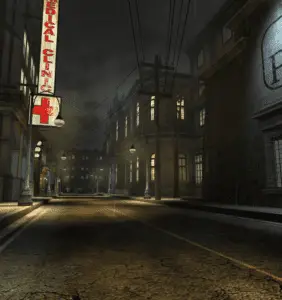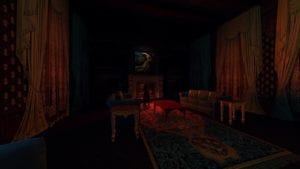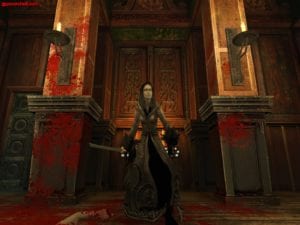Hello, readers of the Fandomentals. In the past, I’ve given you articles that spoke of old games that I remembered fondly. This time, I’m going to talk about a game that’s a bit more topical. Vampire: the Masquerade – Bloodlines, a long and punctuation-heavy title, is slated to get a sequel. Thus I dove back into the 2004 original.
The game takes place in the bleak World of Darkness. It starts with our character becoming one of the Kindred, vampires who stalk the night. What follows is a series of increasingly improbable and outright suicidal missions. It plunges us head-first into the byzantine and cruel world of vampire politics.
The game was highly regarded in its time and well remembered today. Does it deserve it? After beating it again, I will say it does. It holds up remarkably well and there’s a reason people look forward to the sequel. Of course, some things have aged better than others and there’s room for improvement.
Let’s start with what didn’t work with the game, so I can focus on the positives later. First off… it’s painfully clear that the game is made with straight men in mind. I hadn’t noticed it before because I wasn’t as aware of the ways in which it manifests and because I was playing male characters.
After playing it now, with more awareness of other experiences, and with a female character, it became obvious. Most options to seduce or engage in sexual behavior with NPCs are female; if we have an opportunity to seduce men it’s for manipulative purposes. Men will regularly address our female character with terms like “honey”, “babygirl” or “chick”.
Of course, while men can’t generally seduce the male NPCs, most seduction options with female NPCs are available for female PCs as well. This plays into the unfortunate trend of treating queer female relationships as fanservice.
However, I need to mention here that the sequel seems to be on track to fix this particular issue. The developers have stated that they want to give players plenty of freedom in terms of gender, sex and more, including being able to play a transgender character and a variety of body types.
If they deliver on this promise, it’ll definitely feel like solid progress from the first game to the next. In fact, is there any other mainstream game that lets us pick our character’s pronouns or play a transgender character? I can’t really
think of any. Choosing body types is somewhat more common, particularly in MMO games.
Another way in which the game shows its age is the treatment of ethnicity and race. There’s some rather visible stereotyping when it comes to black people, both for NPCs and PCs. Where it gets particularly bad, though, are the Kuei-Jin. They’re the “Cathayan” vampires from “the Orient”. And a merry parade of unflattering Asian stereotypes. Mysterious, sinister, invading the US and infiltrating the native Kindred. To top it off, a Kuei-Jin we fight early on can’t even be bothered to come at us with a Chinese sword, instead using a cheap replica of a katana.
Putting aside socio-political concerns, though, how does the gameplay feel 15 years later? As I said, the game’s graphics and engine have aged surprisingly well. The biggest point of awkwardness are perhaps the player character’s models, which were already stiff and awkward back then and feel more so now.
The game’s weakest part remains its combat. It’s unbalanced and clumsy. Guns are very weak early on, to the point where even if you purchase ranged combat skills and no melee ones, it’s better to use melee weapons for a while. But melee combat mostly boils down to activating Disciplines and flailing in the enemy’s general direction. Later on guns are more effective but force you to buy ammunition constantly.
This is doubly unfortunate because as the game nears its end, there will be more combat and less other content. If you’re not fighting, you’re sneaking. And combat just isn’t very interesting. It’s mostly an exercise in attrition where you try not to spend too much blood or ammo (if using guns).
Enough complaining, though. What does work in the game? It’s mostly the thick atmosphere, strong characters and immersive world. Bloodlines throws us into the dark streets of Los Angeles and makes them breathe. Most NPCs look identical and follow simple paths, but those we talk to are strong and distinct characters.

One thing that the game does very well, and which is particularly important nowadays, is a sense of minimalism. Bloodlines doesn’t try to make a big, open world. It gives us four “hub” locations with smaller branches, in addition to quest locations. But all of it is full of people, content and atmosphere. This sense of quality over quantity is something modern games could use.
The game does give us freedom, though. Not the freedom to roam and kill identical enemies, but freedom to choose. Apart from choices relating to morality or ideology, many quests have multiple solutions – stealth, violence, persuasion and so forth. Side-quests tend to only have one, of course, and there are some that you simply can’t complete without enough points in a skill. Usually picking locks or hacking. This is an illusion of choice that RPGs fall into often.

Where I think the game falls short in terms of choices is morality and humanity. As is often the case in role-playing games, it’s too easy to be nice. You don’t really need to sacrifice anything to do the right thing. This is particularly evident in Bloodlines, as the world is meant to be bleak. Holding on to your humanity should be a struggle. This isn’t really the case here.
What it does portray well is the interplay between the different factions. You have the Camarilla, which is corrupt and hidebound, but enforces the rules that let vampires survive. Prince LaCroix is a petty tyrant who’s out of his depth, but Strauss the Tremere regent is far smarter and far-seeing than that. Then we have the Anarchs, who are far more sympathetic, but can they avoid the fate of victorious revolutions? Some characters espouse the path of independence, which is risky but offers freedom from all this. Then you’ve got the Sabbat… who are crazy monsters. Not much nuance here.
The first choice we make in the game is the choice of our clan, of course. It’s worthwhile to point out the impact they have on the game. In general, every clan will have some unique dialogue, but its frequency varies greatly.
The two clans with the most impact are Malkavians and Nosferatu. The former are all insane, which completely changes your character’s dialogue and many of the reactions to it. As well as such events as talking with a television set or yelling “no, YOU stop” at a stop sign. This doesn’t sit well with me, as it smacks of using mental ilness as humour. But it’s hard to deny that altering gameplay based on your choice to this degree is rare and took a lot of effort.
The Nosferatu are horribly disfigured, such that they threaten the Masquerade just by talking to mortals. Thus they need to travel via sewers and avoid the streets. I can’t help but notice that they could avoid a lot of it by wearing clothes, rather than leather BDSM gear. Regardless, playing as Nosferatu is just different than playing other clans.
All the other clans don’t have such sweeping changes. The Gangrel, Brujah and Toreador feel the most “generic”. Gangrel and Brujah clan weaknesses are virtually identical – they get -1 and -2 to resisting frenzy, respectively.
All this means is that they’ll fall victim to it slightly more often, but experienced players who know how to manage their blood supply don’t risk frenzy anyway. Their clan bonuses are greater strength in frenzy for Gangrel and +1 to unarmed combat for Brujah. Toreador gain or lose two dots humanity whenever they’d gain or lose one. But as I said, saying on highest humanity is trivial.

The two clans that I think strike a balance are Ventrue and Tremere. The former can’t drink blood from rats and have a chance of vomiting after draining the homeless and sex workers (which kind of has unfortunate implications if you ask me…). In return, they can use the Dominate discipline to mind-control NPCs in dialogue. While the Tremere also gain access to it, they can’t use it this way. The Tremere gain unique access to the Thaumaturgy discipline, which is to say blood magic. But they cannot raise their physical attributes to maximum… which, granted, isn’t much of a penalty.
Playing a Ventrue or Tremere will thus feel different than other clans without making it a wholly different experience like the Malkavians or Nosferatu. Not that it’s a bad thing for those two clans to be so different. It is, in fact, something fairly rare in video games. It’s just that making such different experiences for all clans isn’t particularly feasible. And when that fails, I’d rather have more clans like Ventrue than Brujah.
What does it all mean for the sequel? We know that the developers are taking some inspiration from Dishonored and putting the focus on vampire powers rather than mundane equipment. Also that we’ll be picking our clan later in the game, rather than at the start. They also promise to continue the tradition of giving us plenty of choice and role-playing opportunities.
It’s difficult to judge at this stage, but I hope that Bloodlines 2 will strike a better balance between different elements of the game – combat, stealth, dialogue, breaking in. We need to have a wide variety of ways to develop and play our character that remain viable and enjoyable from start to finish. If they can do that, while retaining the first game’s amazing atmosphere, strong characters and narrative… this can be very promising indeed.
Images courtesy of Paradox Interactive

